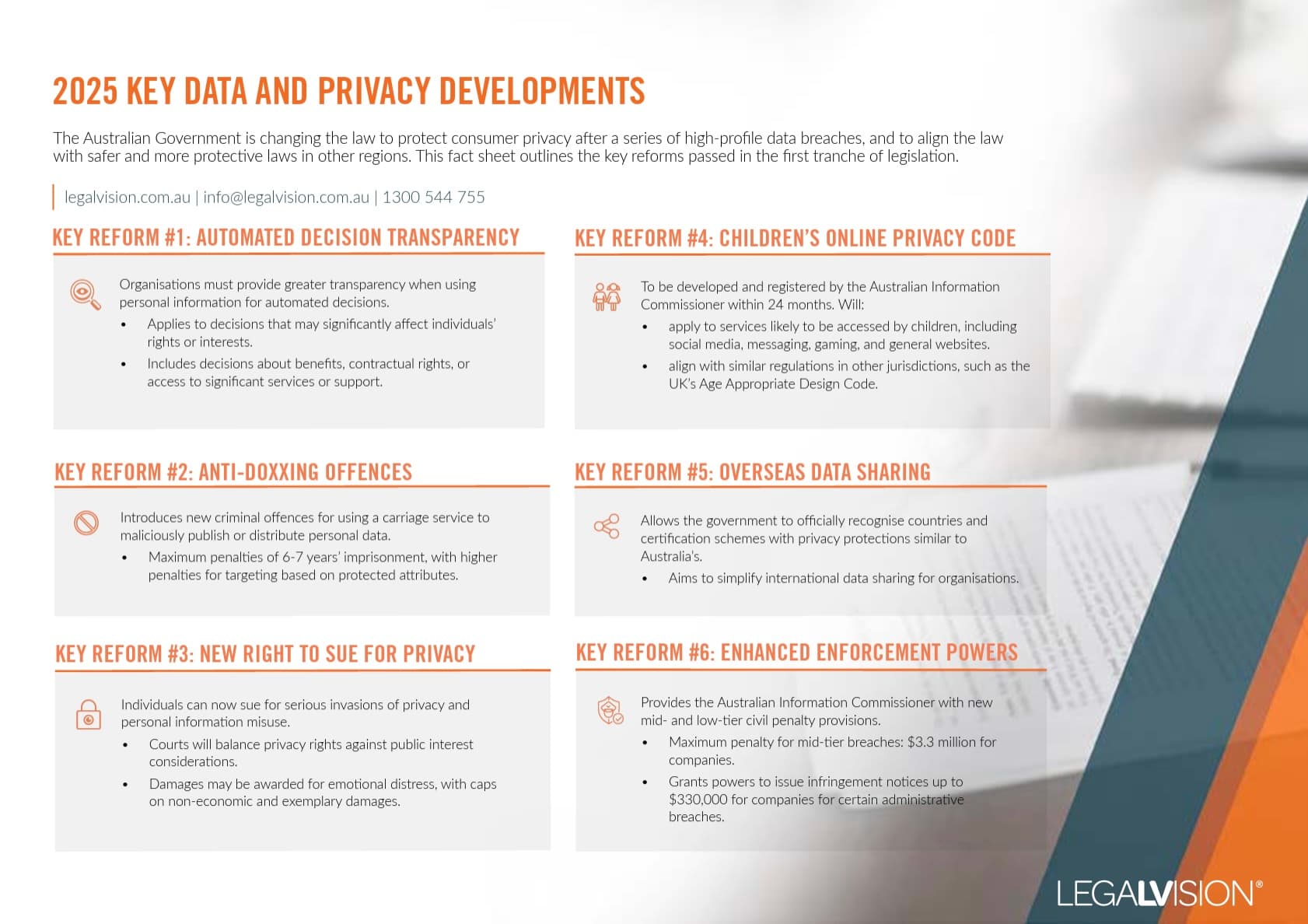In Short
- Healthcare providers must comply with national privacy laws to protect patient information.
- Regularly updating privacy policies and staff training are crucial for compliance.
- Implementing robust data security measures helps prevent unauthorised access to sensitive information.
Tips for Businesses
Ensure your practice regularly updates its privacy protocols and trains staff on patient confidentiality. Use encryption and secure databases to protect sensitive information. Consider consulting privacy law specialists to stay compliant with evolving legal requirements. Prioritise patient trust by maintaining high standards of data security.
As a healthcare service provider, you will undoubtedly deal with patients’ personal information while running your business. Because of the sensitive and private nature of health-related personal data, you have particular legal obligations when handling patient information. It can be difficult to navigate the complex network of interrelated obligations required of you by law. This article will take you through your obligations when dealing with your patients’ personal information and outline some of the steps you can take to protect personal data.
What are Your Obligations When Dealing With Personal Information?
You have several obligations when dealing with your patients’ personal information.
Your Obligations When Managing Personal Information
You are required to:
- be transparent about how you manage personal information. Your patients must be able to easily find out how you plan to store and use their information. This also involves having an up-to-date privacy policy. Your privacy policy should be easy to understand, readily available and should include:
- what personal information you collect and store, and how you collect and store this information;
- the purposes for which you collect, hold, use and disclose personal information;
- how someone can access their personal information and request corrections;
- how someone can complain if you breach their privacy and how you will handle the complaint;
- whether you are likely to disclose personal information overseas and, if so, the countries to which information will be disclosed;
- make sure the personal information you collect is up to date and complete; and
- protect the personal information you collect from being misused, interfered with or lost, and ensure others only access it if authorised.
Your Obligations When Collecting Personal Information
You are required to:
- only collect personal information when necessary to properly operate your healthcare business. This could include collecting a person’s medical history only when they become your patient; and
- destroy or anonymise personal data that you receive without asking for it.
Your Obligations When Disclosing Personal Information
Make sure to:
- only disclose the personal information you collect to someone else if you are disclosing it for the primary purpose you collected it, or for any secondary purpose that the individual has provided consent for. This could include providing information on a specific illness or condition that you collected to inform the patient’s treatment to a specialist who intends to continue that patient’s treatment; and
- only disclose information to people or organisations overseas if:
- disclosure is directly related to the primary purpose for which you collected the information, and you take reasonable steps to ensure that people or organisations follow the obligations under Australian privacy laws. For example, if you need to send patient information to specialist doctors based overseas, you can include specific privacy obligations in your contracts with these overseas doctors to align with Australian privacy laws, ensuring the contracts bind them to comply with these requirements; or
- you have the individual’s express, voluntary and informed consent to do so.
Your Obligations to Provide Information to Patients
You must:
- inform patients and employees about why you collect personal data and the consequences if they do not provide it. Share your privacy policy with them, and explain whether you typically disclose the personal information you collect and, if so, to who; and
- allow your patients and employees to access their personal information.
Your Obligation to Provide Anonymity to Your Patients
As long as it is practical, you must allow your patients to remain anonymous or use a pseudonym when using their information.
What Can You Do to Keep in Line With the Law?
Maintain a Detailed Privacy Policy
The best way to lawfully manage personal information is to have an up-to-date and detailed privacy policy. Your privacy policy should specify why your organisation needs the personal information it collects and detail what you and your employees will do with the personal data you collect. LegalVision’s experienced data and privacy lawyers can help you create a privacy policy that satisfies the law and ensures your patients feel safe, knowing you are taking the proper steps to protect their information.
Make Employees Aware of Their Obligations
You can also take steps to ensure that your employees know what information they can deal with and what they can do with it. This could involve making them aware of your privacy policy through regular training sessions and in-depth training for new employees.
Keep Personal Information Secure
Above all, keeping the personal information you collect safe is essential. Investing in quality digital record management software and being diligent with hard copy information can prevent a data breach and save you time and money in the long run. Implementing government services such as My Health Record can also allow you to safely store and access patient information. Learn more about My Health Record here.

This factsheet outlines the Australian Government’s strengthened consumer privacy laws in 2025 following major data breaches and their alignment with global standards.
Key Takeaways
As a healthcare business, you must ensure that you lawfully handle patients’ personal information. You must manage, collect, and disclose personal information responsibly, and you must inform your patients about your handling of their personal information. You should also offer them the option to remain anonymous.
To stay in step with the law, you should:
- maintain a comprehensive and current privacy policy;
- make sure your employees know their legal obligations when dealing with personal information; and
- take steps to keep personal information secure.
If you need help managing your legal obligations to safeguard health information, our experienced healthcare lawyers can assist as part of our LegalVision membership. For a low monthly fee, you will have unlimited access to lawyers to answer your questions and draft and review your documents. Call us today on 1300 544 755 or visit our membership page.
Frequently Asked Questions
Healthcare providers must clearly communicate how they handle personal information through an up-to-date privacy policy. They must keep data current and secure, allow access to personal information, and offer anonymity when possible. Providers should only disclose personal data for its initial purpose or with patient consent, ensuring overseas disclosures comply with Australian privacy laws.
Healthcare providers securely handle personal information by maintaining a comprehensive privacy policy, training employees on privacy obligations, and using secure digital record systems. They should diligently manage hard copies and consider services like My Health Record for secure data storage and access.
We appreciate your feedback – your submission has been successfully received.












